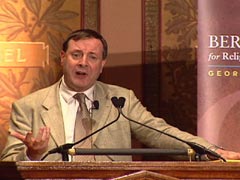In This Episode << SLIDE LEFT TO SEE ADDITIONAL SEGMENTS
Debating Religious Belief
BOB ABERNETHY, anchor: The recent parade of best-selling books by atheists has been followed, not surprisingly, by rebuttals from believers and now formal debates between the two.
We have excerpts today from a debate last week at Georgetown University in Washington. The believer was Oxford University professor of historical theology, Alister McGrath, a Christian. The atheist was journalist and author Christopher Hitchens, who condemns religious belief as dangerous and juvenile.

Christopher Hitchens |
CHRISTOPHER HITCHENS (Journalist and Author, “God Is Not Great: How Religion Poisons Everything”): I can’t believe there is a thinking person here who does not realize that our species would begin to grow to something like its full height if it left this childishness behind, if it emancipated itself from this sinister, childish nonsense.
ABERNETHY: Hitchens took aim at the Christian belief that Jesus’ death atoned for everyone else’s sins.
Mr. HITCHENS: Is it moral to believe that your sins can be forgiven by the punishment of another person? Is it ethical to believe that? I would submit that the doctrine of vicarious redemption by human sacrifice is utterly immoral.
The name for that in primitive Middle Eastern society was scapegoating. You pile all the sins of the tribe on a goat. You drive that goat into the desert to die of thirst and hunger, and you think you’ve taken away the sins of the tribe — a positively immoral doctrine that abolishes the concept of personal responsibility on which all ethics and all morality must depend.
On our integrity, our basic integrity, knowing right from wrong and being able to choose a right action over a wrong one, I think one must repudiate the claim that one doesn’t have this moral discrimination innately — that, no, it must come only from the agency of a celestial dictatorship, which one must love and simultaneously fear.

Dr. Alister McGrath |
Dr. ALISTER MCGRATH (Professor of Historical Theology, University of Oxford): For me God is a celestial liberator. The New Testament talks about the truth setting you free. It talks about the glorious liberty of the children of God. And I fully accept that Mr. Hitchens is very committed to the moral vision, has a real sense of what is right and what is wrong. But can one have a viable moral system without some sort of transcendent basis of morality?
ABERNETHY: McGrath said he is a former atheist.
Dr. MCGRATH: And in the end I came to faith, swapping my old faith of atheism for my new one of Christianity. It was like someone, I suppose, who knew water discovering champagne.
ABERNETHY: McGrath likened his own outlook to that of another Oxford professor — the late C.S. Lewis.
Dr. MCGRATH: “I believe,” he writes, “in Christianity as I believe the sun has risen, not simply because I see it but because by it I see everything else.”
I will gladly concede, because I think Mr. Hitchens is right on this, that there are some forms of religion that are pathological, that damage people. For every one of these atrocities which must cause all of us deep concern, there are 10,000 unreported acts of kindness, generosity, and so forth arising from religious commitment.
ABERNETHY: What became clear from the exchange was that the conflict was between two fundamentally different views of the world.

